Don’t Look Back in Anger: The Rise and Fall of Cool Britannia by Daniel Rachel - review

God, this book made me miss the Nineties. The era of Britpop and Blair, Fever Pitch and TFI Friday, when comedy was the new rock ’n’ roll and Primrose Hill the new Sodom and Gomorrah. It all seems so carefree and innocent in hindsight, even the feuds and the cocaine binges and the rise of toxic lad (and ladette) culture.
Daniel Rachel’s oral history of Cool Britannia identifies a loose period between Damian Hirst’s Freeze exhibition in 1988 and the destruction of the Twin Towers in 2001, during which a weird economic, political and cultural alchemy led to a flowering of British creativity and optimism not seen since the Sixties. The Union Jack was detoxified and a new egalitarianism stalked the land. Actually, the whole thing was pretty London-centric, which is one of the reasons we are where we are today.
Anyway, this was the era when football was adopted by the middle classes thanks to Nick Hornby, David Baddiel and David Beckham, amongst others. When Hirst, Charles Saatchi and Tracey Emin pushed contemporary art onto the front pages. When British fashion became a serious force thanks to figures like Alexander McQueen, John Galliano, Rankin and Kate Moss. It was also a period in which an unholy alliance grew between PR and the media, celebrities and brands, which sowed the seeds of what was to come: reality TV and the career of Robbie Williams.
Rachel’s list of interviewees is impressive, though inevitably you notice the names he couldn’t get, like Hirst, and the areas that are barely covered, like restaurants. Tony Blair and John Major come across as refreshingly frank and transparent. The lairy swagger of Noel Gallagher and Irvine Welsh leap off the page. Emin and Keith Allen are good for anecdotes about getting pissed up at the Groucho, on Channel 4.
Read more
David Wallace-Wells on why going vegetarian won't help the environment
Meera Syal, Echobelly’s Sonya Madan and Gurinder Chadha put the British-Asian perspective. Some of the shrewdest insights come from Sheryl Garratt, former editor of The Face, and the wonderfully named Stryker McGuire, who was bureau chief of Newsweek. Mel C, the lone Spice Girl cited, seems both shrewd and sweet.
Although the Blur-Oasis feud and Jarvis Cocker waggling his bum at Michael Jackson have taken on a rosy hue, Cool Britannia also looks desperately incestuous now. New Labour’s association with Britpop is embarrassing to all concerned. TFI producer Will MacDonald contributes an anecdote of leaving an awards ceremony spread-eagled on the roof of a stretch limo, anchored at each limb by The Pet Shop Boys, Paul Gascoigne and Chris Evans, ending up at Damon Albarn’s house where Justine Frischmann makes them all cheese sandwiches.
The scene that was originally driven by the hard work of those who’d been on the dole, or on Margaret Thatcher’s enterprise allowance scheme, ended up bloated with money, booze, drugs and ego.

Rachel is a former musician and the author of two previous oral histories about pop, and he succinctly arranges his material into themed chapters (on the Millennium Dome and Tate Modern, for instance, or the death of Diana). I tore through it, savouring every high and low point of this hazy, hard-to-define epoch. I particularly loved the incidental detail. For instance, the Spice Girls’ wallpaper range had to be withdrawn because Emma Bunton’s nightie had “F*** off” written on it.
Don’t Look Back in Anger: The Rise and Fall of Cool Britannia by Daniel Rachel (Trapeze, £20), buy it here.
Read more
Read more David Wallace-Wells on why going vegetarian won't help the environment

 Yahoo News
Yahoo News 

